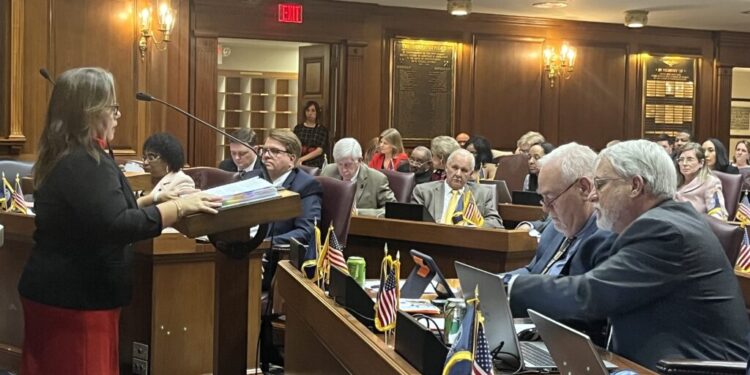The Washington state House approved a bill that would authorize state agencies to hide children seeking transgender medical intervention from parents.
On April 12, House lawmakers debated Senate Bill 5599 (pdf), which creates an exemption for the state that grants it the right to not be required to notify parents of minors who have left their homes because their parents wouldn’t let them pursue gender transition medical procedures.
In a video statement after the vote, Republican state Rep. Chris Corry said the bill “erodes parental rights in the state of Washington.”
“Essentially what the bill would do would be if a child left a parents’ home for certain medical care and went to a shelter or host family, that shelter or host family would not be required to notify the parents of their child’s whereabouts,” Corry said. “This is obviously a fundamental violation of parental rights and something that’s deeply concerning for parents across Washington state.”
State Rep. Peter Abbarno, a Republican, said the crux of the debate over the bill was whether the state be permitted to “essentially hide where the child is.”
Most parents, Corry said, would “go to the ends of the earth to find their child” if they disappeared after an argument.
“And the fact that we have a bill that may become law that would say, ‘we’re not going to tell you,’ was really just a bridge too far for us,” Corry said.
Corry told The Epoch Times that, under the bill, a disagreement between a child and parents over the child’s desire for a medical transition constitutes “abuse and neglect,” only because the parent hasn’t “properly affirmed what the child wants.”
Corry said there are already laws that protect children from abuse and neglect in the state that require “solid and compelling reasons” why children would need to be removed from their homes.
“What’s frustrating is even in those cases, the parents still have a right to know where their kids are after they’ve been removed,” Corry said. “In this case, parents would have no idea.”
House Debate
Republican state Rep. Travis Couture spoke on the House floor in a debate over amendments to the bill, stating that the U.S. Constitution, based on the precedent set by previous Supreme Court rulings, permits the state to interfere with the right of parents only to prevent harm to a child “and any legislation that goes further fails that standard.”
“The Constitution doesn’t tell us what we can do; it tells us what we can’t do to people,” Couture said. “And multiple times our U.S. Supreme Court has ruled in favor of parental rights.”
The Due Process clause of the Fourteenth Amendment “gives parents the right to parent” through the educating and rearing “as they see fit.”
“I think it’s important as we embark on this bill tonight to recognize the very important and critical role parents have not only in our society, and not only with their families and their children but in our law as well,” Couture said.
State Rep. Julio Cortes, a Democrat, said though having a supportive family environment is critical, it doesn’t always determine the best outcome for the success of a child’s well-being.
“But family dynamics as I’m sure a lot of us can agree at times be let’s say complicated,” Cortes said. “Positive mental health outcomes are possible even when a family dynamic is negative, and on the other side negative outcomes are possible even when a family is supportive. This bill is about providing housing security for our trans youth.”
While not addressing parental consent, Cortes shared an anecdotal story about a trans child he said he helped while working with homeless youth.
The child, he said, ran away to protect his family who was being attacked by community members over the child’s decision.
“I had the privilege of working with this youth and through case management and our prevention program we were able to get that youth back home, but we got him back home with the skills and the tools that they needed and that their family needed to make sure that they could be safer,” he said. “Supporting our trans youth is a collective effort, Mr. Speaker, and while families play a critical role, they are not the only support system that these youth need. It takes, as they say, a village.”
Rep. Alicia Rule, a Democrat, defended the bill as legislation to keep youth safe, she said.
“This bill is about our LGBTQ youth that are sleeping on the streets—our most vulnerable youth,” Rule said. “Ideally, of course, all families would have a warm loving, and supportive approach, an accepting family where parents would act as good role models and buffers, but sadly the reality is that some youth don’t, and those are the kids we’re talking about today. When our youth become unsafe because of these reasons we have an obligation to support them and their families and this bill does both.”
State Sen. Marko Liias, a Democrat, said in a March press release when the bill passed in the Senate that the legislation ensures that “young people across the state have a roof over their heads during an already challenging period in their life.”
“While we hope that every child has a supportive family that will provide them with acceptance and the care they need, it’s crucial that we provide housing options to those in crisis,” Liias said.
The House voted 57–39 in favor of the bill after its March passage in the Senate with a vote of 27–19. The bill will be sent back to the Senate for concurrence on amendments added, among those being a bipartisan agreement to include behavioral counseling services to children while in the state’s care.










Discussion about this post